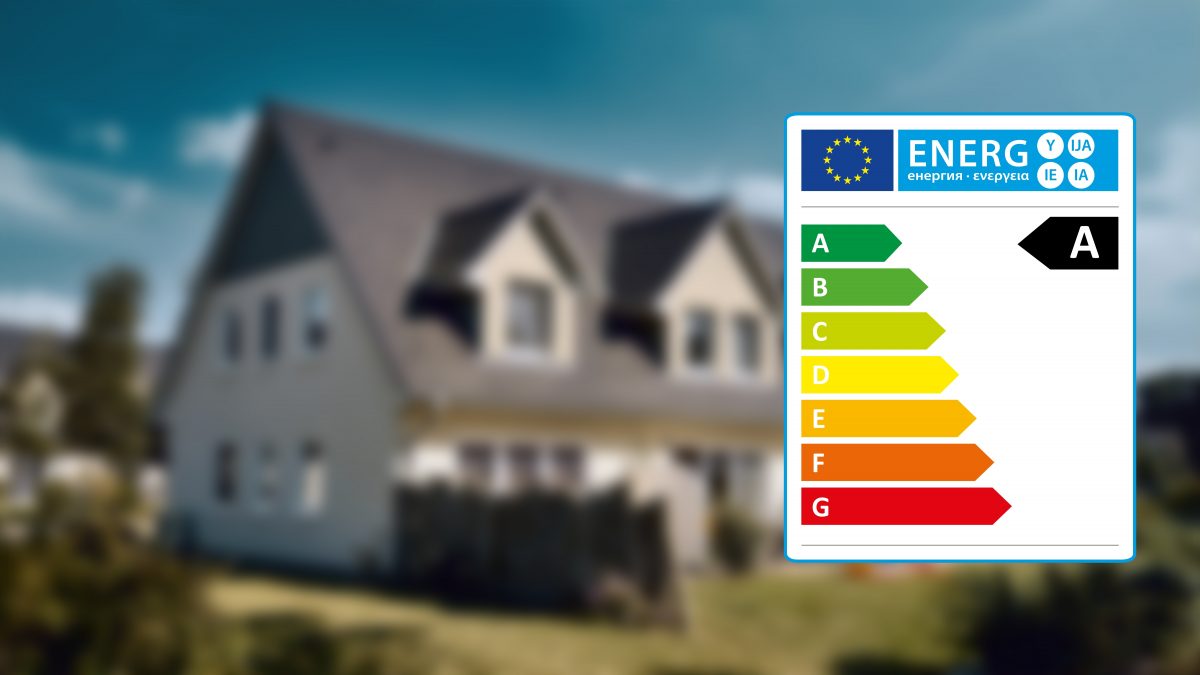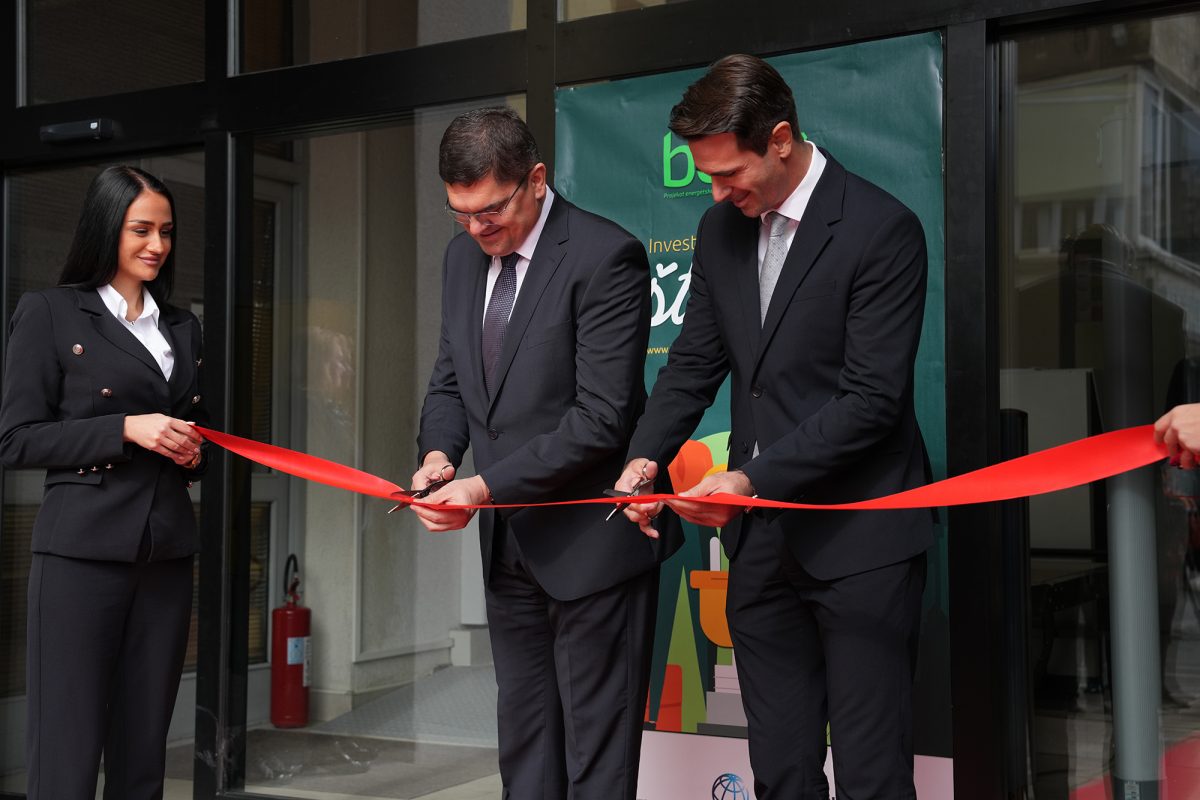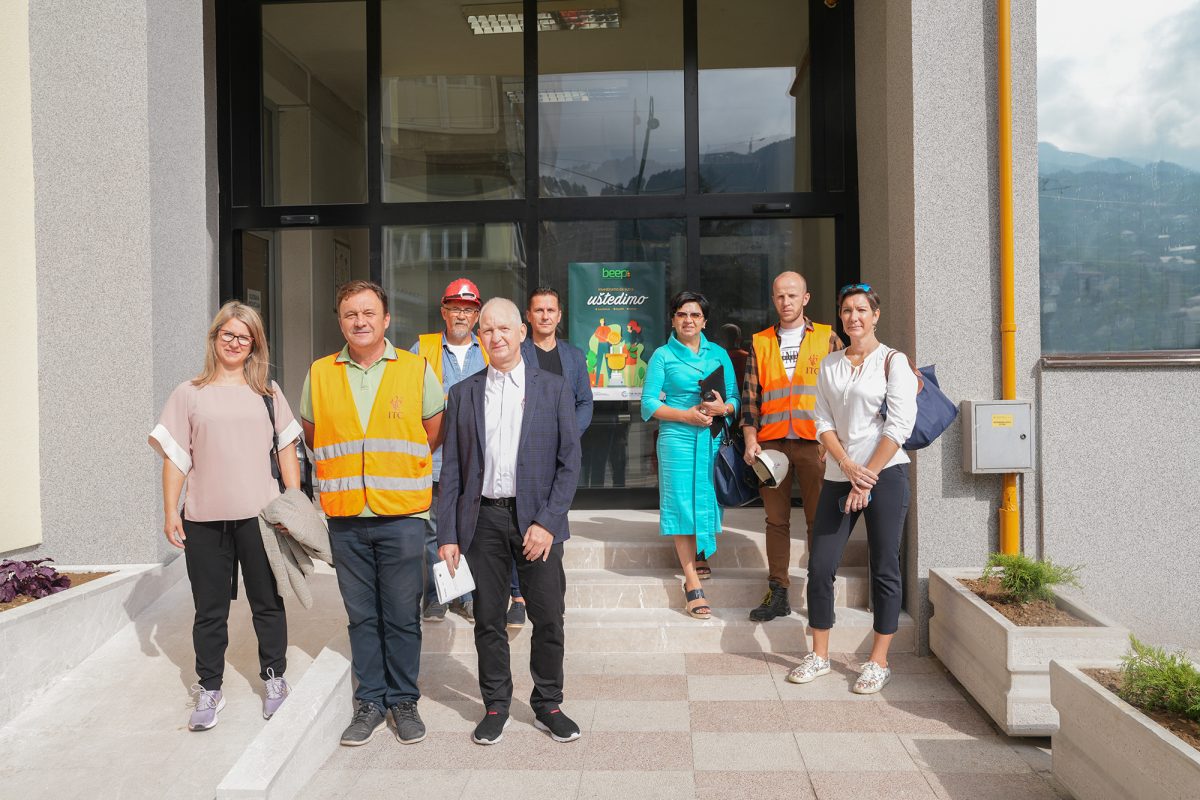Author: admin
Celebration of the Completion of Energy Efficiency Measures Implementation at the University Clinical Hospital Mostar

The implementation of energy efficiency measures at the so-called Diagnostic Annex of the University Clinical Hospital Mostar was symbolically marked in Mostar through a ceremony. This annex includes the Clinical Institute for Radiology, the Institute for Laboratory Diagnostics, and the Institute for Nuclear Medicine.
This is one of the 26 public-purpose facilities in the Herzegovina-Neretva Canton where energy efficiency measures have been implemented as part of the “Energy Efficiency Project for Bosnia and Herzegovina” (BEEP) and Additional Financing for AF BEEP, carried out since 2016. The project has facilitated the renovation of 91 public-purpose buildings, focusing on health and educational institutions.

On this occasion, Željko Nedić, the Minister of the Federal Ministry of Spatial Planning, emphasized, “According to the preliminary results of the current survey conducted by the Ministry, out of over 4,000 public-purpose facilities in the Federation of Bosnia and Herzegovina, more than 50% require the implementation of energy efficiency measures. This represents a significant potential for energy savings and creating better conditions for building users. Through various projects, the EU aims to highlight the benefits of improving energy efficiency in the public building sector. Through years of collaboration with financial institutions and organizations such as the World Bank, UNDP, KfW, Swiss Caritas, and GIZ, and with the support of budgetary funds, the Federal Ministry of Spatial Planning has, in the last eight years, managed to secure funds for the renovation of more than 400 public-purpose facilities, positioning itself as an absolute leader in implementing energy efficiency measures.”
The last facility in the series, the Diagnostic Annex of the University Clinical Hospital Mostar, has been renovated according to world energy efficiency standards, with an investment of 581,709.00 KM. The expected annual energy savings in this facility after implementing measures amount to 133,035.00 kWh/year, significantly reducing CO2 emissions by 60 tCO2/year.

“Medical and non-medical staff in our healthcare system do a job that is hard to compare with any other. Healthcare workers deserve better working conditions in all aspects. It is the government’s obligation to enable this and ensure the entire system’s stability, responsibly adhering to rational frameworks and the objective fiscal possibilities of relevant institutions. Projects like these are significant support to our efforts, and we are greatly thankful to the Ministry of Spatial Planning of the Federation of Bosnia and Herzegovina for implementing the energy efficiency project in the healthcare institutions of our canton,” stated Milenko Bevanda, Minister of Health, Labor, and Social Welfare of the Herzegovina-Neretva Canton.
The works on the facility included thermal insulation of facade walls, replacement of existing joinery and locksmithery, improvement of the thermomechanical system, installation of equipment for measuring energy consumption and monitoring temperature and humidity, and partial replacement of lighting fixtures. The listed improvements will enhance conditions for 620 users of this facility.

The satisfaction with the completed project was not concealed by the director of the University Clinical Hospital Mostar, Prof. Dr. Ante Kvesić, who emphasized on this occasion that with the help of the Federal Ministry of Spatial Planning and the BEEP project, the Mostar Hospital has been significantly modernized.
BEEP is the largest energy efficiency project in Bosnia and Herzegovina and was implemented with World Bank credit. The project is implemented from 2016 to 2024 to present the advantages and sustainability of energy efficiency.
It is estimated that more than 563,500 users of public-sector facilities will benefit from the increase in energy efficiency. By implementing the mentioned project activities, an annual reduction of approximately 13,000 tons of CO2 emissions is expected, with energy savings of more than 36,500 MWh per year. Additionally, this project supports Bosnia and Herzegovina in fulfilling its obligations under the Energy Community Agreement, committing to implementing EU directives in energy efficiency.

Keep your home warm this winter with these tricks

Nowadays, we know that we cannot control the weather, but we can control our impact on climate change, which is gaining momentum. In recent years, it has become apparent that small changes in our daily habits are crucial to reducing energy consumption. Climate change is becoming increasingly pronounced, so we must engage in environmental protection.
One of the aspects we can influence is our energy consumption in the household. The electrical appliances we use often contribute to high electricity bills. But the good news is that simple tricks can help us use energy more efficiently, thereby reducing costs and the ecological footprint.
One of the critical tips is the optimal use of the thermostat. You are setting the thermostat to a temperature between 18-21°C, and lowering the temperature when you are not at home or sleeping can significantly reduce energy consumption. Smart thermostats go one step further by allowing you to program the temperature according to your needs, adapting to your schedule.
Using smart plugs is also a helpful strategy. Smart sockets represent an innovative solution for efficiently managing household energy consumption. By implementing intelligent sockets in the household, users can save electricity bills significantly. With these advanced technological solutions, it is possible to eliminate standby consumption and ensure that devices are turned off automatically when not in use.
In addition to technological tricks, there are also simple lifestyle changes that can contribute to energy conservation. Instead of turning up the temperature on the thermostat, dress in layers and use warm blankets. Drinking warm beverages, such as tea or cocoa, can also help keep you warm, reducing the need for intensive heating.
The use of daylight also significantly impacts energy efficiency, so keep the curtains open during the day to make the most of the sun’s energy, reducing the need for artificial lighting. In addition, carpet installation in the home not only contributes to aesthetics but also plays a vital role as an excellent heat and sound insulator. Choosing a carpet as a floor covering creates a pleasant atmosphere and provides additional thermal insulation in cold rooms. At night, closing the thermal curtains or blinds can keep the heat inside the room, thus reducing the need for intensive heating.
These small but practical steps can significantly reduce energy consumption and contribute to savings on heating bills during the cold winter months. All these tips are helpful for our household and the planet we are trying to provide a more sustainable future.
Wise consumption: The role of the calorimeter in the transformation of energy habits

Preserving energy efficiency has become imperative in modern society to reduce energy costs and negative environmental impacts. Installing a calorimeter is critical in improving the energy efficiency of homes and business premises.
The calorimeter is a sophisticated device that enables precise measurement of heat energy consumption in the building. By installing this instrument, users get a detailed insight into their energy consumption, which allows them to identify potential losses and manage consumption more efficiently. In this way, users can adapt their habits and technologies to reduce energy losses, directly contributing to cost reduction.
Calorimeters can be applied in various contexts, including heating, cooling, ventilation, and manufacturing. This device measures the amount of heat transferred through the system, enabling precise energy consumption monitoring. In addition to monitoring the temperature, this device measures the current and total water flow through the system and the present and complete consumption of thermal energy, expressed in kWh. Installation is usually done at the entrance to the living space, in front of the apartment door, or the building’s staircase if one calorimeter is used for all apartments in the building.
Installing the calorimeter also facilitates the implementation of intelligent energy management systems. Smart thermostats and automatic control systems can use information obtained from the calorimeter to dynamically adjust the operation of heating and cooling systems according to actual needs.
The return-on-investment period varies between two and five years, depending on user habits, quality of insulation, and time spent in the home or office.
Installing a calorimeter brings economic benefits and a significant contribution to environmental protection. Reducing energy consumption automatically minimizes the emission of harmful gases, positively affecting ecology. By laying the foundations of energy efficiency, we build a sustainable future together, preserve the planet’s resources, and minimize negative environmental impacts.
Symbolic Marking of the Completion of Works on the Implementation of Energy Efficiency Measures at the Building of Judicial Institutions of FBiH as Part of the Energy Efficiency Project for Bosnia and Herzegovina (BEEP)
Symbolic Marking of the Completion of Works on the Implementation of Energy Efficiency Measures at the Building of Judicial Institutions of FBiH as Part of the Energy Efficiency Project for Bosnia and Herzegovina (BEEP)

In Sarajevo, a symbolic ceremony marked the completion of works on implementing energy efficiency measures at the Building of Judicial Institutions of the Federation of Bosnia and Herzegovina. This is one of the 20 public purpose buildings in Sarajevo Canton where energy efficiency measures have been implemented within the framework of the “Energy Efficiency Project for Bosnia and Herzegovina” (BEEP) and Additional Financing AF BEEP, which has been implemented since 2015. The project has enabled the renovation of 89 public buildings, focusing on health and educational institutions.
On this occasion, the Minister of Spatial Planning Željko Nedić pointed out: “According to the available data, the average energy consumption in public buildings in Bosnia and Herzegovina is three times higher than the average of the European Union (EU), which categorizes them as energy inefficient buildings. According to the preliminary registry, currently implemented by the Ministry, there are more than 4,000 public purpose buildings in the Federation of Bosnia and Herzegovina, and energy efficiency measures need to be implemented for more than 50% of these buildings. This represents a significant potential for energy savings and creating better conditions for the users of the buildings.”

As part of this project, the Building of Judicial Institutions of the Federation of Bosnia and Herzegovina was renovated with a focus on energy efficiency, which resulted in an investment of about two million one hundred and forty thousand KM. The expected annual energy savings in this facility after implementing the measures amounts to 613,538.00 kWh/year, which will result in a significant reduction of CO2 emissions of 270 tCO2/year.
“The Energy Efficiency Project for Bosnia and Herzegovina (BEEP) achieved more than the simple renovation of a building. This renovation made it possible to improve comfort for all users of the institutions located in this facility. The facilities where we work should not only be spaces for conducting work, but places where people feel comfortable and motivated to give their best,” stated Vedran Škobić, Minister of Justice.

By implementing energy efficiency measures at the Building of Judicial Institutions of the Federation of Bosnia and Herzegovina, better conditions are provided for the daily stay and work of 265 facility users. The works were conducted in accordance with world standards in energy efficiency, including thermal insulation of facade walls, replacement of carpentry and locksmithing, thermal insulation of the roof, and replacement of existing lighting and heating with energy-efficient solutions.
BEEP is the largest energy efficiency project in Bosnia and Herzegovina, implemented with World Bank loans. The project is being implemented from 2015 to 2024 with the goal to present the advantages and sustainability of energy efficiency. About 563,000 users of facilities in the public sector will have multiple benefits from the increase in energy efficiency. Through the implementation of the project activities, a reduction of CO2 emissions of almost 12,000 tons per year is expected, while the desired annual energy savings amount to over 34,000 MWh. Also, this project supports Bosnia and Herzegovina in fulfilling its obligations from the Energy Community Agreement, which committed itself to implementing the EU directive in energy efficiency.
JZU UKC TUZLA – Clinic for internal diseases
JZU UKC TUZLA – Clinic for internal diseases
Address: Trnovac bb
Heated area: 9.716,96 m2
Energy efficiency measures:
- Thermal insulation of facade walls
- Replacement of existing carpentry
- Partial replacement of lighting fixtures
Total investments (BAM with VAT): 1.635.111,65
Total energy savings (thermal and electrical): kWh/year
JZU UKC TUZLA – Clinic for internal diseasesCO2 emissions: tCO2/year
Start of works: 21/11/2023
Diagnostic annex SKB Mostar – JZU SKB Mostar
Diagnostic annex SKB Mostar – JZU SKB Mostar
Address: Bijeli brijeg bb, Mostar
Heated area: 3.061 m2
Energy efficiency measures:
- Thermal insulation of facade walls
- Replacement of existing carpentry/locksmith;
- Improvement of the thermomechanical system,
- Partial replacement of lighting fixtures.
Total investments (BAM with VAT): 581.709,00
Total energy savings (thermal and electrical): 133.035,00 kWh/year
CO2 emissions: 60 tCO2/year
Start of works: 10/10/2023
Implementation of energy efficiency measures at the building of Judicial Institutions of FBiH in Sarajevo
The World Bank supports the sustainable future of Bosnia and Herzegovina
The Energy Efficiency Project for Bosnia and Herzegovina (BEEP and Additional Financing for BEEP) is being implemented since 2016, and so far 89 public buildings have been renovated within this project, comfort has been improved for about 563,000 users and 2,300 green jobs have been created.

On this occasion, the World Bank delegation today visited the building of the Judicial Institutions of the FBiH in Sarajevo, which is one of 20 public buildings that have undergone the process of implementing energy efficiency measures as part of the Sarajevo Canton Project, in which 14 million BAM were invested. The project “Energy Efficiency for Bosnia and Herzegovina” (AF BEEP) is financed through loans from the World Bank, and the results achieved by the project in the period from 2016 to 2023 are the best example of good synergy between the ministry, project team and investors. About 2,140.000 BAM was invested in the renovation of the building of the Judicial Institutions of FBiH. The expected annual energy savings in this facility, after the implementation of the measures, amounts to 613,538.00 kWh/year, which will result in a significant reduction of CO2 emissions of 270 tCO2/year. The total area of the building of the Judicial Institutions of FBiH is 5,725 m2. By implementing energy efficiency measures, at the same time, better conditions were ensured for the daily stay and work of 265 users of this educational institution.

The works were carried out in accordance with world standards in the field of energy efficiency, and included various measures, from thermal insulation of facade walls, partial replacement of existing carpentry/lockwork, thermal insulation of the roof, along with replacement of the covering, installation of a central space cooling system, with the installation of a new pipe network and installation of valve convectors, replacement of existing boilers with more energy efficient ones, as well as partial replacement of lighting fixtures. This investment aims to reduce energy consumption in public buildings, contribute to the economic sustainability of current energy costs and reduce CO2 emissions. The BEEP project represents an important step towards improving energy efficiency and sustainability in Bosnia and Herzegovina and contributes to the goals of ecological sustainability and better working conditions in public institutions.

The World Bank delegation, together with the Federal Ministry of Spatial Planning, will continue to monitor the implementation of energy efficiency measures to ensure the further progress of this important project for Bosnia and Herzegovina. By implementing the activities within the BEEP and AF BEEP projects, it is expected that CO2 emissions will be reduced by more than 12,000 tons per year, while energy savings on an annual level amount to more than 34,000 MWh.


































